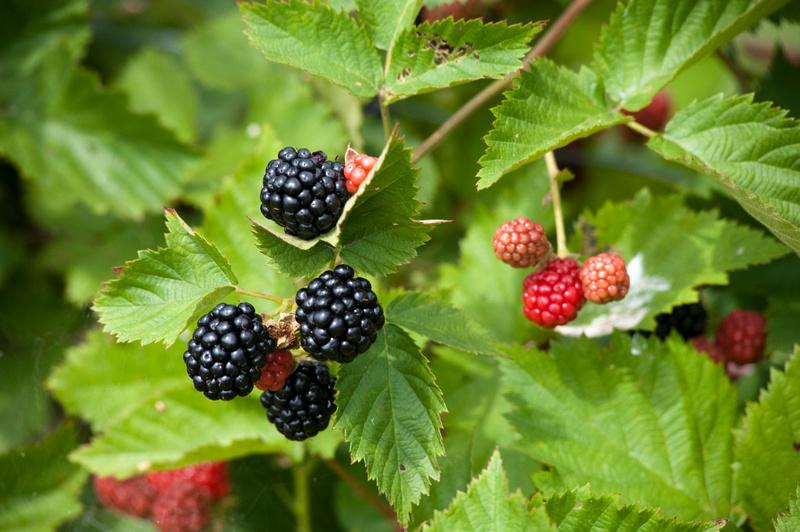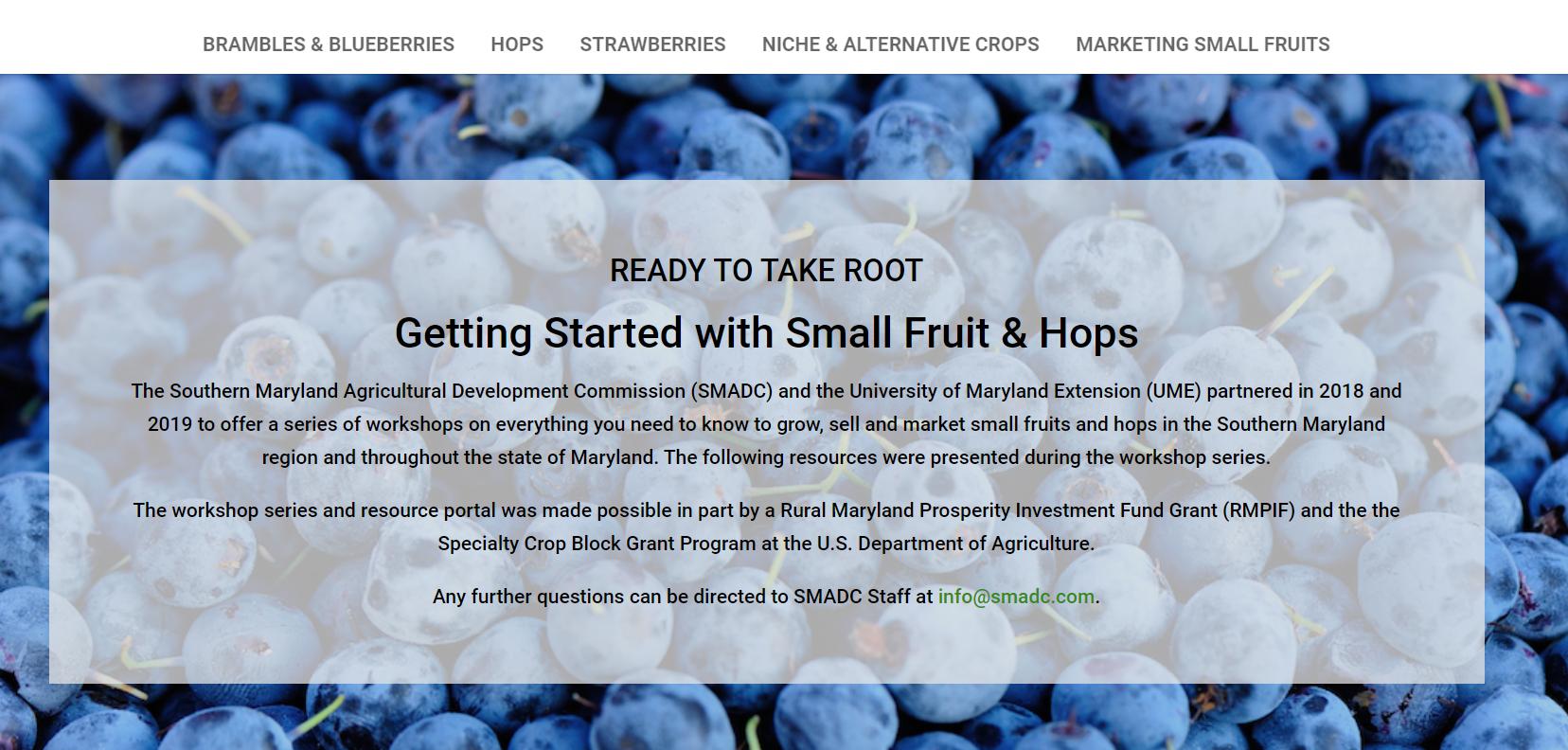
Commercial Production Guides
- The Mid-Atlantic Berry Guide for Commercial Growers
This guide is produced by Penn State in cooperation with Rutgers University, the University of Delaware, the University of Maryland, Virginia Tech, and West Virginia University.
(2013-2014) provides general information on preplant considerations, soil management and nutrition, and pest management, as well as specific information for planting strawberries, blueberries, brambles, gooseberries, and currants. Appendixes provide information on expanded special topics, diagnostic services, nursery sources of berry plants, and production supplies and services. Additional sources of information are also given.
- Raspberry and Blackberry Production Guide for the Northeast, Midwest, and Eastern Canada - NRAES-35 (pdf)
Authors: Bushway, Lori; Pritts, Marvin; Handley, David
Cornell University Library, eCommons
Includes 14 chapters, 134 color photos, 36 line drawings, 30 tables of useful information, 70+ cultivar descriptions, sample calculations, and a glossary. Field production is emphasized and high tunnel and greenhouse production are reviewed.
Commercial Storage and Produce Safety
Commercial Storage
- The Commercial Storage of Fruits, Vegetables, and Florist and Nursery Stocks (Handbook # 66, Revised Feb. 2016)
Edited by Kenneth C. Gross, Chien Yi Wang, and Mikal Saltveit. Gross and Wang are formerly with the Food Quality Laboratory, Beltsville Agricultural Research Center, USDA, Agricultural Research Service, Beltsville, MD. They are now retired. Saltveit is with the Department of Plant Sciences, University of California, Davis, CA.
Agriculture Handbook 66 (AH-66) represents a complete revision and major expansion of the 1986 edition. It has been reorganized and now includes 17 Chapters and 138 Commodity Summaries written by nearly a hundred experts in plant science and postharvest technology. This version, like the previous editions of AH- 66 in 1954, 1968, 1977, and 1986, presents summaries of current storage requirements of fresh fruits, vegetables, cut flowers, and other horticultural crops. However, this highly expanded version also includes information on quality characteristics, maturity indices, grading, packaging, precooling, retail display, chilling sensitivity, ethylene production and sensitivity, respiration rates, physiological disorders, postharvest pathology, quarantine issues, and suitability as a fresh-cut product. A large number of fruits and vegetables were added, as well as sections on food safety, nutritional quality, texture, and fresh-cut produce. The purpose of storing plant material is to lengthen the time it can be consumed or utilized. In doing so, it is critical to provide an environment that minimizes deterioration, maintains microbial safety, and retains other quality attributes. AH-66 provides guidelines and other important information for storing and handling horticultural commodities to accomplish this.
Produce Safety
- Produce Safety
The University of Maryland Plant Science Department, Food Safety Group collaborates with the Maryland Department of Agriculture Food Quality Assurance Program, UMD Agriculture Law Education Initiative, and the University of Maryland Extension Food Safety to provide Maryland farmers and producers with support, education, and assistance in fresh produce safety.
Pest, Disease, and Weed Management
Spray Programs or Pest Advisory
- Spray Program for Multi-Small Fruit Plantings
R. David Myers, University of Maryland Extension
Multi-Small Fruit Spray Program (updated yearly) for the control of major small fruit (Strawberries, Brambles, Blackberries, Raspberries, Blueberries, Grapes Pest and Disease.)
- IPM Net
IPMnet is an online resource for commercial ornamental plant production and maintenance with an emphasis on using an integrated pest management approach. We primarily work with nursery growers, landscapers, greenhouse growers, cut flower growers, IPM scouts, and arborists.
- Maryland Fruit & Vegetable Blog
Provides readers with current information on fruits and vegetables, disease and pest updates, and much more.
- Plant & Pest Advisory
Rutgers Cooperative Extension
Provides seasonal updates focusing on insects, diseases, and weeds of importance to NJ Commercial Growers.
Pests
Brown Marmorated Stink Bug
- Stop BMSB
Collaborators: USDA/NIFA - Specialty Crop Research Initiative, USDA -Ag Research Services, Rutgers, Penn State, Virginia Tech, University of Delaware, University of Maryland, Northeastern IPM Center, Washington State University, Cornell University, Organ State University, and North Carolina State University.
Stop BMSB Web Site is bringing its latest findings to growers in North America. A group of 50 researchers from 10 institutions across the United States is solving the mysteries of this pest that damages a huge range of fruit, vegetable, and ornamental crops. You will find a photo identification guide and recommendations for how to control it.
Spotted Wing Drosophila
- Spotted Wing Drosophila
Penn State Extension Pest Alert, Authors: K. Demchak, D. Biddinger, and A. Surcică; Pictures: A. Surcică; Reviewers: B. Butler, E. Rajotte, S. Spichiger, L. Donovall, and K. Bernhard; Horticulture Program November 2011
Part 1: Overview and Identification
Part 2: Natural History
Part 3: Monitoring
Part 4: Management
Weed
- An IPM Weed Pocket Guide for Weed Identification in Field Crops (E3081)
Michigan State University Extension, Compiled and edited by Wesley Everman, Joy Landis
Bramble Production Methods
Organic
- Brambles: Organic Production
By George L. Kuepper, Holly Born, and Janet Bachmann, NCAT Agriculture Specialists; Published January 2003; Updated March 2017 By Luke Freeman, NCAT Agriculture Specialist ©NCAT IP022
This publication focuses on organic practices for blackberry and raspberry production. It discusses cultural considerations including site selection, establishment, pruning, and trellising, and it introduces organic practices for fertility, weed, disease, and insect management. It also provides new information on greenhouse production and season extension and addresses economics and marketing.
Season Extension
- Primocane Raspberry Season Extension Technology
Joseph A. Fiola, Ph.D.
Tunnel Production
- Tunnel Production
Cornell Fruit Resources: Berries
This site features information for growers and educators on all types of protected culture for strawberries and brambles.
Preparing and Selecting Cultivars
- Start Growing Thornless Blackberries: How to Prepare and Select Cultivars for the Mid-Atlantic (FS-2023-0660)
Haley Sater, Extension Agent, University of Maryland Extension-Wicomico County.
Websites
- Bramble Production
Cornell Fruit Resources: Berries, Cornell University
Resource pages on general production, pollination, site selection and preparation, cultivar selection, soil nutrient management, plant growth and development, and pruning and trellising.
- Fruit
Penn State Extension
Web pages on Production & Harvesting, Cultivars & Rootstocks, Soil Fertility & Management, Pest & Diseases, Weed Management, Organic Production, Sustainable Agriculture, Personal Safety, and Business Management.
- Ready to Take Root-Getting Started with Small Fruit & Hops
The Southern Maryland Agricultural Development Commission (SMADC) and the University of Maryland Extension (UME) partnered in 2018 and 2019 to offer a series of workshops on everything you need to know to grow, sell and market small fruits and hops in the Southern Maryland region and throughout the state of Maryland. The workshop series and resource portal was made possible in part by a Rural Maryland Prosperity Investment Fund Grant (RMPIF) and the Specialty Crop Block Grant Program at the U.S. Department of Agriculture.
Educational Articles
- Orange Rust is a bigger problem than usual this year in brambles
Gerald (Jerry) Brust | Published Vegetable and Fruit News, Vol. 15, Issue 4 - Reminder to Start Monitoring Spotted-wing Drosophila
Dr. Kelly Hamby and Emily Zobel | Published Vegetable and Fruit News, Vol. 15, Issue 4
Useful Links
University of Maryland Research Laboratories
- Hamby Lab
Dr. Kelly Hamby
Associate Professor/Extension Specialist
Organizations
- Maryland State Horticultural Society
- New York State Berry Growers Association
- North American Raspberry & Blackberry Association
